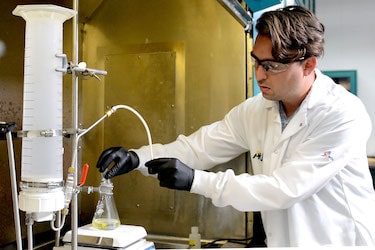 Chemical engineering is a broad, diverse subject that covers many industries. At its core, this field is dedicated to processes that convert raw materials into high-value products, which can include fuels, drugs, foods, plastics, and even hygiene products.
Chemical engineering is a broad, diverse subject that covers many industries. At its core, this field is dedicated to processes that convert raw materials into high-value products, which can include fuels, drugs, foods, plastics, and even hygiene products.
An online chemical engineering degree teaches how chemicals can be processed to develop new products or treatment systems. To become a chemical engineer, you’ll need a smart head for biology, chemistry and mathematics. By studying chemical engineering, you give yourself the opportunity to enjoy a wide range of different careers as chemical engineers are employed in a variety of industries and projects. A chemical engineer might be involved in cooking up new pharmaceuticals, but could equally well be employed in the manufacturing sector. A chemical engineer might also work in the pollution or environmental testing sector.
THE CAREER PATH
The most obvious is a career as a chemical engineer, but you can also go into other highly advanced career fields such as energy engineering, nuclear engineering, or petroleum engineering. With your background in chemical engineering, you could move into a career as a process-development scientist, which is a career used by manufacturing companies to control the processes that make a product or material. You could also move into a career as an energy manager, which plans, monitors, and regulates energy use in an organization or facility.
As you can see, there are many different opportunities available for people who are trained in chemical engineering, and this diversity of opportunity is one of the main advantages for this field. Chemical engineers are employed in research facilities, energy companies, medicine manufacturing, and more. They also have excellent pay among most careers. For example, chemical engineers, nuclear engineers, and biochemists have median pay over $90,000 a year.
- Chemical Engineer—Seeking to advance fuel, drugs, food, and many other products, chemical engineers work with chemistry, physics, math, and biology with a goal of designing processes and equipment, often for manufacturing. They work mostly in laboratories and offices, although they may spend time at industrial plants and refineries. The outstanding pay is one of the top motivators for this career. The median salary according to the BLS is $102,160, but the top 10% can expect salaries over $169,000 a year, making it a lucrative and rewarding career field. Job growth is 8%, which is roughly on par with the national average, and there should be over 35,000 jobs for chemical engineers by 2026.
- Nuclear Engineer—Nuclear energy has many risks but infinite advantages if it can be properly and safely harnessed. It’s the responsibility of nuclear engineers to research and develop new processes for using this technology, and some will also be focused on finding new uses for radioactive materials or developing power sources for ships and spacecraft. With a degree in chemical engineering and a cross-focus on nuclear engineering, people in this field can expect a median salary of $105,810, making it one of the highest-paying careers available. The top 10% in this field can also expect salaries over $159,000, so there is plenty of room for advancement. However, the career will only grow by 4%, which essentially amounts to a reduction compared to the overall job market.
WHO IS THE IDEAL CANDIDATE?
To excel in chemical engineering, you first and foremost need an analytical nature. Much of the study and the subsequent work will involve testing results that come from mixing various chemicals, with goal of eventually reaching a marketable or useful product, so a curious, analytical mind is essential. The ability to work as a team is also important, as you’ll have to collaborate, both in school and in your career, with many different levels of the development process; taking direction, working with team members, and conveying feedback in a productive manner is essential to this career field. Finally, you need attention to detail. Chemical engineering involves numerous materials that need to be mixed in a highly precise manner, and sometimes in a specific, time-sensitive sequence. Keeping these details organized will be essential to your success.
WHAT SHOULD I LOOK FOR?
You can become a chemical engineer with a bachelor’s of science in engineering, but most licensed chemical engineers hold or pursue a master’s in science in chemical engineering. Expect an online degree major in this area to include core courses in chemistry, advanced math, physics, chemical engineering analysis, chemical engineering thermodynamics, hazardous materials, chemical reaction engineering and transport phenomena.
Chemical engineering is a difficult major to study online because this discipline requires access to dangerous and complex chemicals as well as advanced lab equipment. Licensed engineers who already work in the chemical industry, and who are employed in corporate or government lab settings, will want to explore online master and graduate degrees in chemical engineering.
Chemical engineering degrees online are competitive programs. To gain admission to an online master’s program in this engineering major area, you may need to hold a bachelor’s degree in chemical engineering from an ABET-accredited school, with an undergraduate GPA of 3.0 or above for last 60 hours of that degree. Some engineering programs will accept applicants with non-engineering bachelor’s for graduate study online in chemical engineering. Generally this rule applies to the non-thesis master of engineering (ME) degree rather than master of science (MS) in engineering degree programs.
COST
Want to learn more about the top online chemical-engineering programs? Click on any program below to get more information on tuition, accreditation, and admission requirements.
